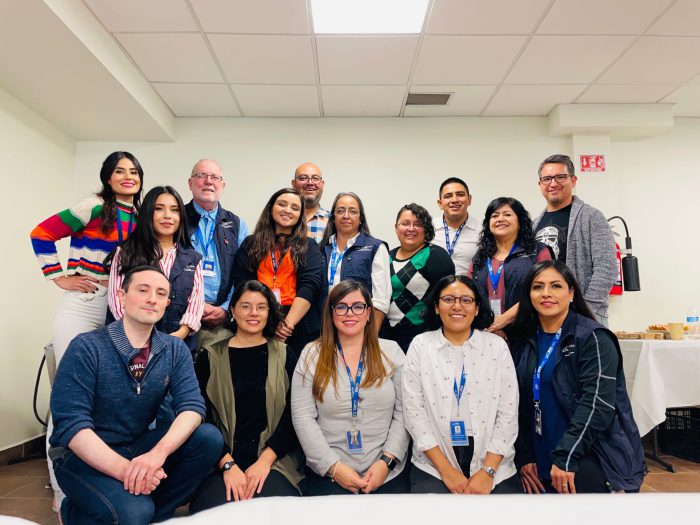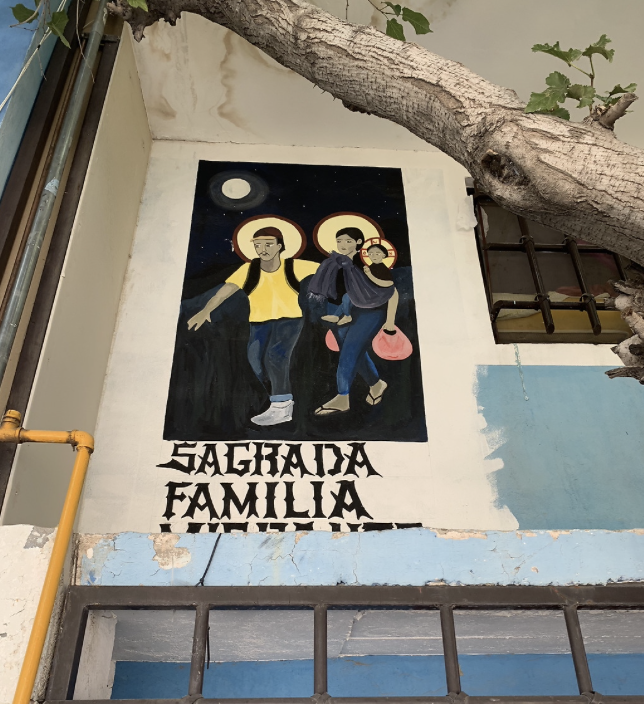Meet Jovana, Manager of the JRS/USA Migrant Accompaniment Network
02 February 2024|Chloe Gunther
This story first appeared in JRS INSIDER, a monthly newsletter including stories of impact across JRS global.
“Refugees are you and I with different circumstances,” said Jovana Nieto, Jesuit Refugee Service/USA Community Accompaniment Network Manager. Although she does not quite recall where she heard this sentiment first, Jovana reflects on this phrase often as she remains steadfast in supporting migrants and volunteers within the JRS community.
For January’s edition of INSIDER, Jovana sat down to talk about her experience leading the Network and how accompanying migrants and volunteers has shaped her understanding of both companionship and the migration journey. From the moment we started talking, Jovana spoke with passion and energy for the Network and with admiration for the volunteers she works with. “I am honored to work with people of faith, compassion, and action.”
In fiscal year 2023, there were 2.5 million encounters of migrants at the US – Mexico Border. As push factors continue to force people from their homes in search of safety in another country, this number will rise. This is why the need for a compassionate response to those arriving to the US and policies that provide legal pathways to enter the country are more necessary than ever.
 The Migrant Accompaniment Network is a branch of Caminar Contigo, a JRS/USA border program that walks with people throughout each step of their migration journey by providing mental health and psychosocial support, legal services, and emergency assistance. The Network connects migrants with a support system in their destination cities once they leave the border area.
The Migrant Accompaniment Network is a branch of Caminar Contigo, a JRS/USA border program that walks with people throughout each step of their migration journey by providing mental health and psychosocial support, legal services, and emergency assistance. The Network connects migrants with a support system in their destination cities once they leave the border area.
Jovana brought me back to the beginning of the program, which started just about three years ago. “It was a lot of learning as we went and learning from the experience of volunteers,” Jovana explained.
JRS/USA developed partnerships with several different parishes and grassroots organizations at the time to help support individuals arriving at the border but there was not a system in place to provide sustainable accompaniment. Yet, Jovana explained, learning from the experience of migrants and volunteers has allowed the Network to be more collaborative and effectively meet the specific needs of each individual. Today, over 50 Network volunteers reside in 34 different cities.
Jovana herself moved to El Paso, Texas when she was in the 5th grade. She described life at the border.
“Living at the border is different than living anywhere else,” Jovana said. She described the beautiful sharing of culture and relationships that happens in the binational community. Many people commute to work every day between the two countries.
Part of the Network’s purpose is to help individuals transition further into the interior of the United States. Most often, referrals are made to the Network in one of three ways: Jovana or other JRS/USA staff meet an individual in a migrant shelter, a national or international partner recommends the Network, or individuals find JRS/USA independently.
When her schedule allows, Jovana visits the migrant shelters along the border to meet individuals, understand their stories, and figure out how to best respond to their specific needs. On one of these visits, she met a young family from Venezuela.
“The people I meet, they feel like my friends, almost like family,” she explained. She found out the family was heading to New York City where a couple different volunteers are active.
JRS/USA provides legal and mental health and psychosocial support (MHPSS) assessments to migrants and puts them in touch with a case manager who helps gather all necessary information. Based on this intake, individuals are connected with appropriate volunteers from the Network.
Jovana described what the first few days look like when a migrant arrives in their new city. Highest priorities are often clothing, health care, and employment. Once those needs are met, volunteers will accompany individuals as they navigate public transportation, enroll their children in school if applicable and accompany the migrant to court appointments.
In new cities, volunteers can serve as companions and support systems based on their capacity. “Even being available to answer questions or get a cup of coffee can help make someone feel more welcome in the community,” Jovana said.
In discussing the next several years, Jovana said the Network is focusing on outreach, fundraising, and garnering more legal support for migrants. “In my work, I have learned that people of the Church are really good and truly believe in following the ways of Jesus Christ.”
Congress has proposed restrictive asylum policies in exchange for US funding overseas, creating a critical moment for the asylum system. You can accompany migrants and asylum seekers from wherever you are in the country by clicking here to fill out a JRS/USA pre-written letter urging policymakers to reject harmful asylum policies. By sending a message to lawmakers, your voice can help establish more legal pathways for people to rebuild their lives safely and humanely in the US.



